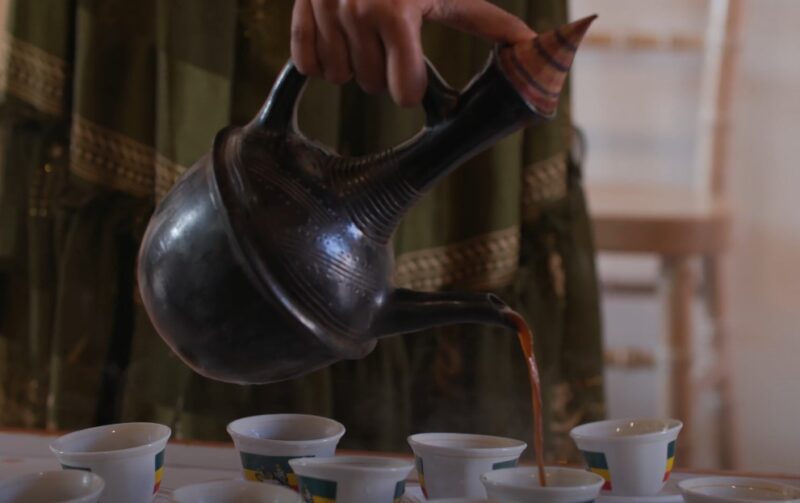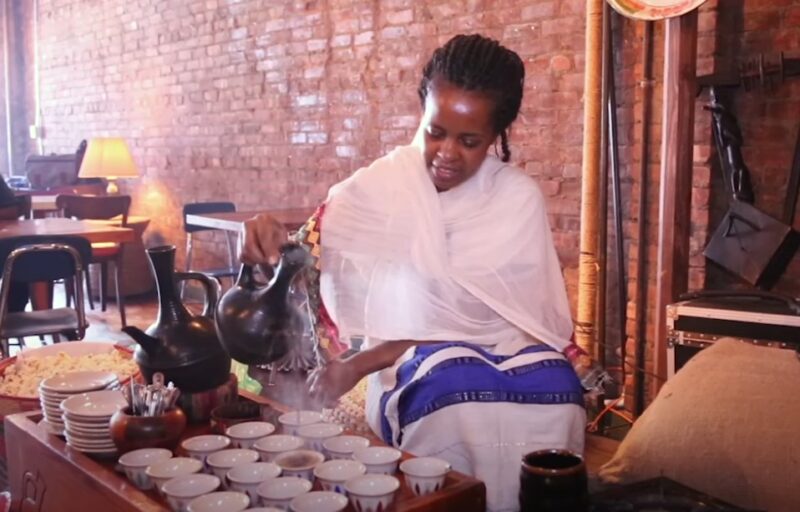Discover the rich traditions of the Ethiopian coffee ceremony, a ritual steeped in history and cultural significance.
This ceremony is not just about drinking coffee; it’s a vibrant, communal experience that encapsulates the spirit and cultural heritage of Ethiopia.
Here are five fascinating facts that offer a deeper insight into this unique cultural phenomenon.
5. Historical Roots

The Ethiopian coffee ceremony is steeped in rich tradition, tracing back to the legendary tale of Kaldi, a goat herder whose discovery of coffee berries energized his flock. This story marks the beginnings of a practice that has evolved significantly over the centuries.
Originally, the Ethiopian coffee ceremony was a religious ritual, integral to the spiritual life of local communities.
Over time, it transcended its religious origins to become a cornerstone of social interaction in Ethiopia. The evolution reflects broader social changes, adapting to the communal needs of different eras while retaining its core elements.
The practice serves as a living link to Ethiopia’s past, showcasing the adaptive nature of cultural traditions and their role in unifying diverse groups within the society.
Today, Ethiopia exports roughly 400,000 metric tons of coffee every year.
4. Cultural Significance

The coffee ceremony in Ethiopia transcends the mere consumption of coffee, embodying a profound cultural significance in daily Ethiopian life.
This ceremony is a pivotal event in Ethiopian social life, providing a platform for community bonding, information exchange, and conflict resolution.
It takes place three times a day:
- In the morning
- At noon
- In the evening
It is traditionally hosted by women and can last several hours, symbolizing hospitality and respect.
This ritual not only fosters social cohesion but also serves as an educational space where elders impart wisdom and cultural values to the younger generation, ensuring the continuity of community practices and oral histories.
3. Ceremonial Process

The Ethiopian coffee ceremony is a detailed and ritualistic process that highlights the cultural reverence for coffee.
The ceremony begins with the cleansing and roasting of green coffee beans, where the host skillfully shakes the roasting pan over an open flame, filling the air with aromatic smoke—a signal to gather.
After grinding the beans with a mortar and pestle, the coffee is brewed in a traditional pot called a ‘jebena’.
The brewing coffee must boil over to symbolize abundance, after which it is carefully poured into small cups from a height to mix the coffee with the froth.
Each step, performed with precision and grace, underscores the craftsmanship involved, making the final cup a true labor of love and artistry.
2. Symbolic Meanings

Each element of the Ethiopian coffee ceremony is laden with symbolism, reflecting deep-seated cultural and social values.
From the arrangement of the grass on the floor, signifying fertility and nature’s bounty, to the selection of the coffee cups, which show respect for the guests based on age and social status, every detail has meaning.
The person who pours the coffee, usually the youngest woman in the family, signifies respect and acknowledgment of her role in the family dynamics.
The invitation to partake in the coffee, often extended to neighbors and passersby, is a sign of peace and unity, showcasing the Ethiopian ethos of hospitality and community.
1. Modern Adaptations and Global Influence
As the world becomes increasingly interconnected, the Ethiopian coffee ceremony has found new expressions and adaptations globally.
In modern times, the ceremony has been both preserved and adapted by the Ethiopian diaspora worldwide, serving as a cultural ambassador that introduces Ethiopian traditions to a global audience.
In cities from Los Angeles to London, Ethiopian restaurants and coffee houses host ceremonies that adhere to traditional methods while incorporating local flavors and customs, thus broadening its appeal.
The ceremonial approach to coffee preparation has influenced the specialty coffee industry, emphasizing the artisanal, ritualistic aspects of coffee brewing that resonate with global trends towards mindfulness and cultural appreciation.
The Bottom Line
The Ethiopian coffee ceremony is more than just a method of preparing coffee; it is a celebration of community and tradition that resonates deeply within and beyond Ethiopia’s borders. Each fact we’ve explored illuminates the intricate layers of this ceremony, highlighting its significance as both a cultural practice and a symbol of hospitality.
As this ritual continues to influence global coffee culture, its roots remain firmly planted in the rich soil of Ethiopian heritage.
